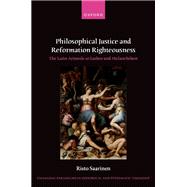Philosophical Justice and Reformation Righteousness The Latin Aristotle to Luther and Melanchthon
, by Saarinen, Risto- ISBN: 9780198951186 | 0198951183
- Cover: Hardcover
- Copyright: 8/1/2025
The churches of the Reformation highlight the righteousness of faith (Iustitia Dei) as the core of their theology. Martin Luther formulated this doctrine as an alternative to the Aristotelian virtue of justice. This volume shows, however, that many different versions of philosophical justice circulated in Luther's days. Some of them already affirm the relational features that characterize later Reformation theology.
As Protestant scholarship has not attended to the philosophical commentaries on Aristotle and the formative impact of Anselm and John Duns Scotus in philosophy and theology, the medieval background of imputative and forensic righteousness is much broader than earlier studies assume. This volume argues that a new historical paradigm of Iustitia Dei can be outlined by investigating the complex interaction between Anselmian and Aristotelian thought available in late medieval and Renaissance commentaries.
The philosophical trajectory of justice underwent a profound transformation before the sixteenth century. While Thomas Aquinas considers that 'the just' is the object of justice, later scholastic commentators affirm an increasingly subjective and voluntary constitution of justice. In Franciscan thinking, this development leads to a view in which the interplay between the lord and the subjects defines the realm of justice. On the one hand, this interplay is connected to biblical views and the teaching of Anselm. On the other, it permeates the early modern considerations of justice. Therefore, the new paradigm outlined in this study influences both Reformation theology and the broader intellectual history of justice in Western thought.
As Protestant scholarship has not attended to the philosophical commentaries on Aristotle and the formative impact of Anselm and John Duns Scotus in philosophy and theology, the medieval background of imputative and forensic righteousness is much broader than earlier studies assume. This volume argues that a new historical paradigm of Iustitia Dei can be outlined by investigating the complex interaction between Anselmian and Aristotelian thought available in late medieval and Renaissance commentaries.
The philosophical trajectory of justice underwent a profound transformation before the sixteenth century. While Thomas Aquinas considers that 'the just' is the object of justice, later scholastic commentators affirm an increasingly subjective and voluntary constitution of justice. In Franciscan thinking, this development leads to a view in which the interplay between the lord and the subjects defines the realm of justice. On the one hand, this interplay is connected to biblical views and the teaching of Anselm. On the other, it permeates the early modern considerations of justice. Therefore, the new paradigm outlined in this study influences both Reformation theology and the broader intellectual history of justice in Western thought.






